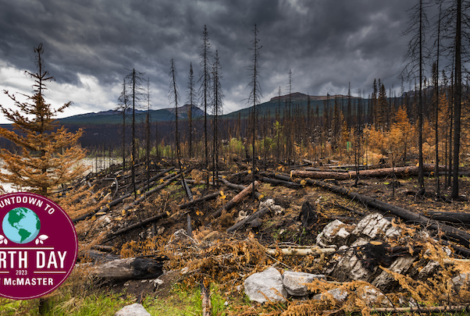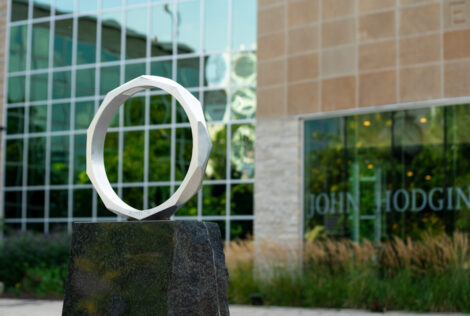
Expertise
Hydrogeology, fractured rock, contaminant transport, particulate contaminants, pathogen transport, point-of-use water treatment, local water security.
Areas of Specialization
Research Clusters
-
Associate Dean, Undergraduate
Faculty of Engineering
-
Professor
Civil Engineering
Overview
Dr. Dickson-Anderson is an expert in hydrogeology, specializing in fractured rock systems. Her research program focuses on characterizing these systems and investigating the transport and fate of particulate and chemical contaminants within them. A comprehensive understanding of groundwater flow and contaminant transport is essential for aquifer vulnerability studies, which assess the risks posed to water and drinking water security.
Dr. Dickson-Anderson’s work emphasizes water security in rural, remote, and Indigenous communities. She uses a coupled systems approach that balances the physical, social, environmental, and economic considerations of local contexts. She collaborates across disciplines to develop a holistic understanding of water security, encompassing its physical, social, cultural, and economic elements. Her research includes developing groundwater management and protection tools, and utilizing process-based and data-driven models and laboratory-scale experiments to support local decision-making and inform policy.
Sarah Dickson-Anderson obtained her Ph.D. from the University of Waterloo in November 2001 and began her tenure at McMaster University’s Department of Civil Engineering in January 2002. Her research focuses on enhancing groundwater management and protection, particularly in fractured rock environments, through integrating laboratory and field studies with process-based and data-driven models. This work aims to both advance practical approaches to groundwater management and protection, and generate evidence to inform policy. Her work has been recognized with awards such as the Philomathia Professorship in Water Policy and Research in 2017 and an Early Researcher Award in 2009. At McMaster, Dickson-Anderson has mentored 69 research students, including 15 Ph.D. students, 23 Master’s students, 5 postdoctoral fellows, and 24 undergraduates. Additionally, she has secured over four million dollars in research funding.
Doctor of Philosophy, Civil Engineering University of Waterloo, Waterloo, Ontario, 2001 Dissertation: The dissolution of dense non-aqueous phase liquids in variable aperture fractures. Supervisor: N.R. Thomson Bachelor of Applied Science, Civil Engineering, Water Resources Option University of Waterloo, Waterloo, Ontario, 1995 Graduated on Dean’s Honour Roll
Philomathia Professorship in Water Policy and Research, 2017-2020; Dean’s Teaching Honour Roll, 2016; President’s Award for Excellence in Graduate Supervision (nomination), 2018; Early Researcher Award, Ontario Ministry of Research and Innovation 2009 – 2014
- Essien, A. E., Guo, Y., Khafagy, M., & Dickson‐Anderson, S. E. 2024. Design and hydrologic performance estimation of highway filter drains using a novel analytical probabilistic model. Scientific Reports, 14(1), 2350. doi: 10.1038/s41598-024-52760-7
- Essien A. E.*, Guo Y. and Dickson-Anderson S. E. (2023). Extensive rainfall data analysis: event separation from continuous record, fitting of theoretical distributions, and event-based trend detection. Environmental Science: Advances, 2(5), 695-708. doi: 10.1039/D2VA00294A
- Blackburn E.*, Dickson-Anderson S.E., Anderson W. and Emelko M. B. 2023. Biological Filtration is Resilient to Wildfire Ash-Associated Organic Carbon Threats to Drinking Water Treatment. ES&T Water 3(3), 639–649. doi:10.1021/acsestwater.2c00209
- Lucier K.J.*, Dickson-Anderson S.E., Skead D., Skead K., Kosmas E., Schuster-Wallace C.J. 2023. “That water out there is no damn good for anybody”: Experiences with declining water quality in a First Nation community. Can. Water Resour. J. doi:10.1080/07011784.2022.2122084
- Khafagy M.*, Dickson-Anderson S.E. and El-Dakhakhni W. 2022. A Rapid, Simplified, Hybrid Modeling Approach for Simulating Solute Transport in Discrete Fracture Networks. Computers and Geotechnics, 151, 104986. doi:10.1016/j.compgeo.2022.104986
- Schuster-Wallace C.J., Dickson-Anderson S.E., Papalexiou, S. and El Ganzouri A.* 2022. Design and Application of the Tank Simulation Model (TSM): Assessing the Ability of Rainwater Harvesting to Meet Domestic Water Demand. J. Environ. Inform. 40(1), 16-29. doi:10.3808/jei.202200477
- Apatinga G.A.*, Schuster-Wallace C.J. and Dickson-Anderson S.E. 2022. A Conceptual Framework for Gender and Climate Mainstreaming to Mitigate Water Inaccessibility in Rural sub-Saharan Africa. WIREs Water doi:10.1002/wat2.1591
- Khafagy M.*, El-Dakhakhni W. and Dickson-Anderson S.E. 2022. Multi-Gene Genetic Programming Expressions for Simulating Solute Transport in Fractures. J. Hydrol., 606, 127316. doi:10.1016/j.jhydrol.2021.127316
- Khafagy M.*, El-Dakhakhni W. and Dickson-Anderson S.E. 2022. Analytical Model for Conservative and Reactive Transport in Fracture Network. Computers & Geosciences, 159, 104983. doi:10.1016/j.cageo.2021.104983
- Deb Nath B.*, Dickson-Anderson S.E. and Schuster-Wallace C.J. 2022. Headwater-to-consumer drinking water security assessment framework and associated indicators for small communities. Water Resour Manage, 36, 805–834. doi:10.1007/s11269-021-02985-2
- Blackburn E.*, Emelko M.B., Dickson-Anderson S.E. and Stone M. 2021. Advancing on the promises of techno-ecological nature-based solutions: A framework for green technology in water supply and treatment. Blue-Green Systems, 3(1), 81-94. doi:10.2166/bgs.2021.008
- Narayanan B., Yosri A., Ezzeldin M., El-Dakhakhni W. and Dickson-Anderson S.E. 2021. A complex network theoretic approach for interdependence investigation: An application to radionuclide behavior in the subsurface. Computers & Geosciences, 157, 104913. doi:10.1016/j.cageo.2021.104913
- White K.J., Dickson-Anderson S.E., Majury A., McDermott K., Hynds P.D., Brown R.S. and Schuster-Wallace C.J. 2021. Exploration of E. coli Contamination Drivers in Private Drinking Water Wells: An Application of Machine Learning to a Large, Multivariable, Geo-Spatio-Temporal Dataset. Water Research. 197, 117089. doi:10.1016/j.watres.2021.117089
- Lavallee S., Latchmore T., Hynds P.D., Brown R.S., Schuster‐Wallace C., Dickson‐ Anderson S. and Majury A. 2021. Drinking Water Consumption Patterns among Private Well Users in Ontario: Implications for Exposure Assessment of Waterborne Infection. Risk Anal. 41(10): 1890-1910. doi:10.1111/risa.13676
- Yosri A.*, Dickson-Anderson S.E., Siam A. and El-Dakhakhni W. 2021. Analytical description of colloid behavior in single fractures under irreversible deposition. J. Colloid Interf. Sci. 589: 597–604. doi:10.1016/j.jcis.2020.12.089
- Yosri A.*, Dickson-Anderson S.E., Siam A. and El-Dakhakhni W. 2021. Transport pathway identification in fractured aquifers: a stochastic event synchrony-based framework. Adv. Water Resour, 147. doi:10.1016/j.advwatres.2020.103800
- Lavallee S. Hynds P.D., Brown S., Schuster-Wallace C. Dickson-Anderson S.E., Di Pelino S., Egan R. and Majury A. 2021. Examining influential drivers of private well users’ perceptions in Ontario: A cross-sectional population study. Sci. Total Environ. 763. doi:10.1016/j.scitotenv.2020.142952
- Irvine A., Schuster-Wallace C., Dickson-Anderson S.E. and Bharadwaj L. 2020. Transferrable Principles to Revolutionize Water Governance in First Nation Communities in Canada. Water 12(11). doi:10.3390/w12113091
- Lucier K.J.*, Schuster-Wallace C.J., Skead D., Skead K. and Dickson-Anderson S.E. 2020. “Is there anything good about a water advisory?”: an exploration of the consequences of drinking water advisories in an Indigenous community. BMC Public Health 20(1):1704 doi:10.1186/s12889-020-09825-9
- Latchmore T., Hynds P.D., Brown R.S., Schuster-Wallace C., Dickson-Anderson S.E., McDermott K. and Majury A. 2020. Analysis of a Large Spatiotemporal Groundwater Quality Dataset, Ontario 2010 – 2017: Informing Human Health Risk Assessment and Testing Guidance for Private Drinking Water Wells. Sci. Total Environ. 738. doi:10.1016/j.scitotenv.2020.140382
- Yosri A.*, Dickson-Anderson S.E. and El-Dakhakhni W. 2020. A Modified Time Domain Random Walk Approach for Simulating Colloid Behavior in Fractures: Method Development and Verification. Water Resour. Res. 56(7):e2020WR027599 doi: 10.1029/2020WR027599
- Lakhian V.* and Dickson-Anderson S.E. 2020. Reduction of bromate and chlorate contaminants in water using aqueous phase corona discharge. Chemosphere 255 doi:10.1016/j.chemosphere.2020.126864
- Paez A., Anjum Z.*, Dickson-Anderson S.E., Schuster-Wallace C.J., Ramos B.M. and Higgins C.D. 2020. Measuring accessibility in infrastructure-poor regions – A methodological note J. Transp. Geogr. 82, 102564 doi: 10.1016/j.jtrangeo.2019.102564
- Abioye S.O.*, Dickson-Anderson S.E. and Krantzberg G. 2019. Desalination – A Potential Solution to Growing Water Scarcity: A Case Study of Middle East and North Africa. Journal of Chemical Engineering and Industrial Biotechnology 5 (1), 1-15 doi: 10.15282/jceib.v5i1.3741
- Hoffman, T., Hynds P., Schuster-Wallace C., Dickson-Anderson S. and Majury A. 2019. Harnessing Smart Technology for Private Well Risk Assessment and Communication. Water Security 6, 100026 doi: 10.1016/j.wasec.2019.100026
- Di Pelino, S., Schuster-Wallace, C.J., Hynds, P.D., Dickson-Anderson, S.E. and Majury










